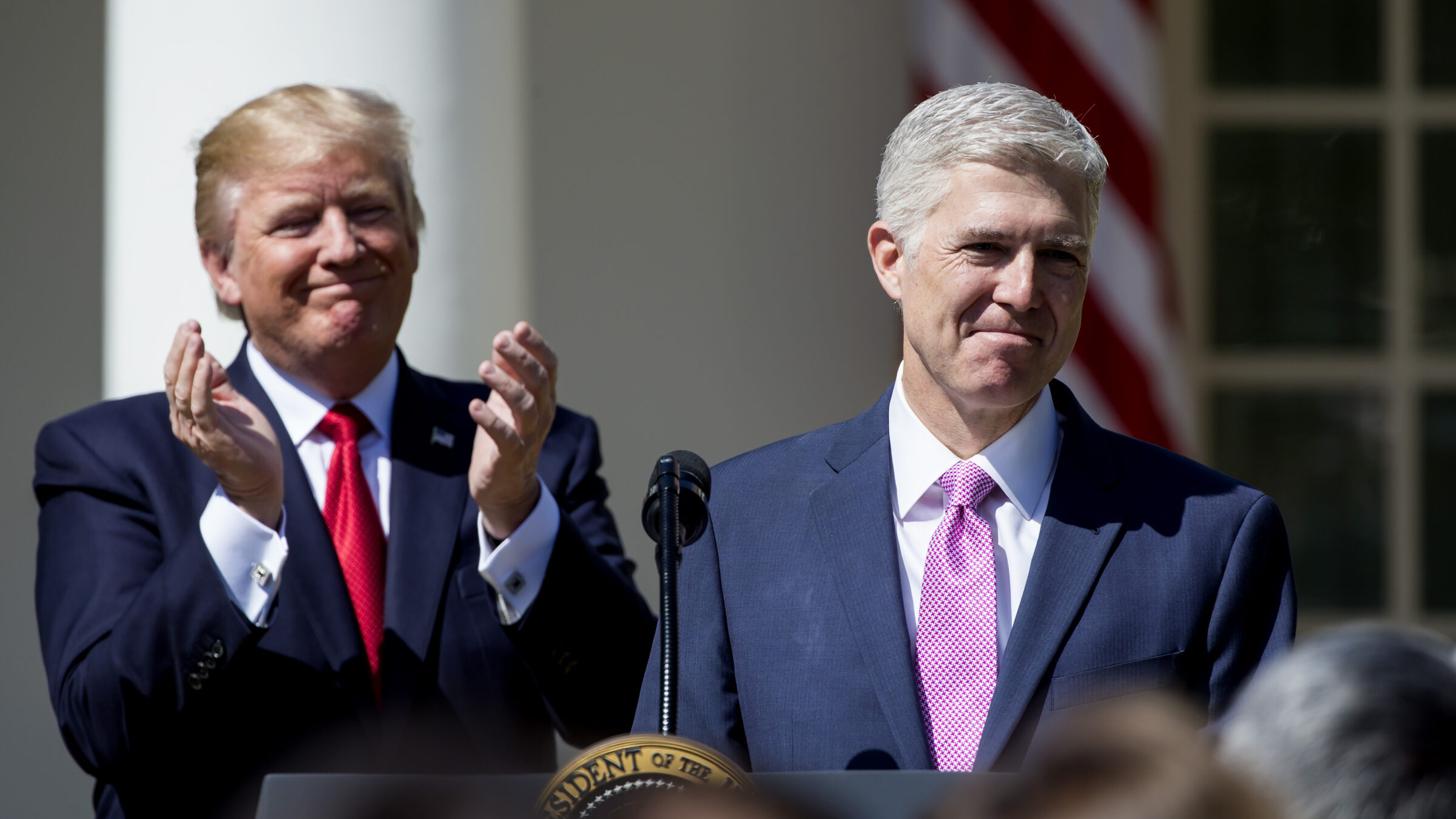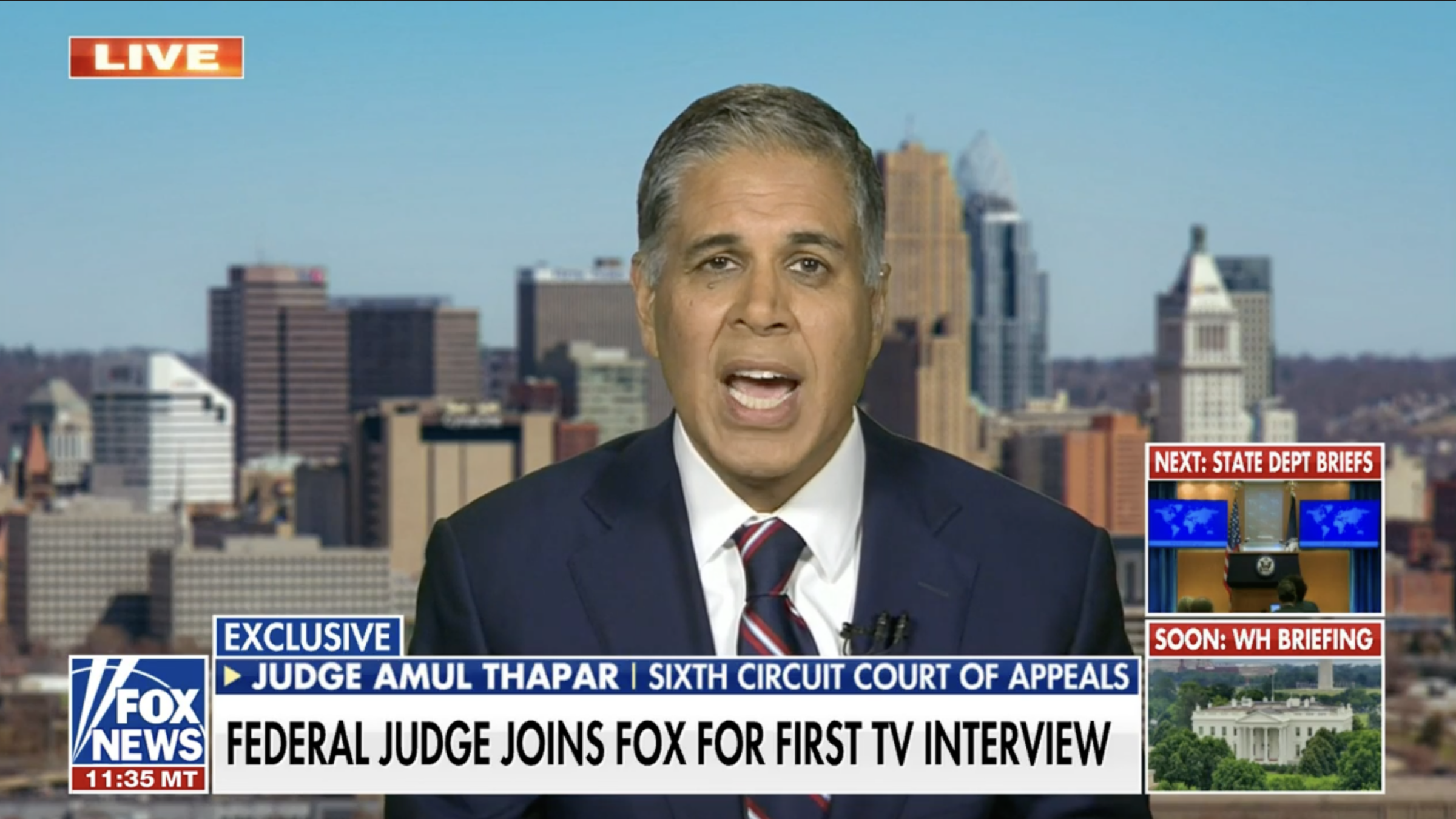Welcome to the FedSoc Twelve, a Balls & Strikes series about some of Donald Trump’s most unhinged judicial appointees. These judges, whether in their legal opinions or their off-the-clock conduct, have continued to push Trump’s agenda from the bench, forming something of a life-tenured Originalism Caucus within the federal judiciary. This summer, we’ll be checking in on these men and women now that they’ve gotten a chance to spread their wings during the Biden administration—and as they fight to be first in line for a Supreme promotion the next time Republicans control the White House.
The Bio
Amul Thapar has been a true-believing conservative his entire life. In a quip that became infamous in certain circles, his own father once said that after Amul learned he had voted for Obama, “he nearly wouldn’t speak to me.” And his family says that since he was a kid, he only ever dreamed of being on the Supreme Court.
He graduated from UC-Berkeley’s law school in 1994 and clerked for judges in the Southern District of Ohio and the notoriously conservative Sixth Circuit. After that, he worked his way through a series of jobs, including stops at the elite law firms Williams & Connolly and Squire Patton Boggs as well as federal prosecutors’ offices in D.C. and Ohio. President Bush appointed him to be U.S. Attorney for the Eastern District of Kentucky in 2006, then appointed him to the district court in that same jurisdiction the following year.
After nearly a decade in Louisville, Trump put him on his shortlist of nominees to replace Antonin Scalia (after Mitch McConnell successfully prevented President Barack Obama from confirming a nominee). Amul even got to the interview stage, but Trump ultimately chose to go with Neil Gorsuch. A few months later, as a consolation prize, Trump put him on the Sixth Circuit.

Thapar’s family says that since he was a kid, he only ever dreamed of being on the Supreme Court (Photo by Eric Thayer/Getty Images)
The Opinions
As a district judge, Thapar was notable for how frequently the Sixth Circuit called him up to pinch-hit. District court judges can sit on appellate court cases; it’s called “sitting by designation.” It’s easiest for a judge to sit on the circuit court where their district is a member, but they can also hear cases in other circuits. Generally, there’s nothing really nefarious about this. It’s a way for busier circuit courts to spread their workload out and for district court judges to learn how appeals courts look at the cases that district courts send them. But Thapar averaged more than one appeals court case every month before he ever got on the Sixth Circuit, more than twice the average for other district court judges in that circuit.
Why were his services so in demand at the Sixth Circuit? Perhaps, as SCOTUSBlog delicately put it in 2018, his “tenure as a prosecutor may have influenced his approach to criminal law cases,” and the right-wing Sixth Circuit knew it could count on him to be a reliable conservative vote. He proved that in 2013, when he sat by designation on a case in the Eastern District of Tennessee and, despite being Catholic himself, sent a nun to prison for being too good at being Catholic.
That case, United States v. Walli, typifies Thapar’s whole deal. Three anti-nuclear weapon activists, including 82-year-old Catholic nun Sister Megan Rice, “broke in” to a highly secure federal facility holding enriched uranium (but no nuclear weapons) with a pair of wirecutters and old-fashioned gumption. They sprayed some graffiti, dumped some buckets of blood, sang to a security guard, and turned themselves in. The federal government promptly charged them under the Sabotage Act, a law that was adopted to punish attempted Nazi saboteurs in World War II. At trial, the defendants didn’t dispute what they did, but argued that nuclear weapons were “designed to terrorize and kill civilians” and that disrupting nuclear weapons design and production was morally justified. A jury disagreed, finding them guilty.
Even though a jury convicted them, the defendants’ lawyers argued that the evidence didn’t support the verdict. Convicting someone under the Sabotage Act requires that a defendant intends to “interfere with the national defense.” The trio argued that their actions didn’t, and couldn’t, actually interfere with the United States’ ability to nuke the world three times over. They pointed to cases in military courts that only upheld convictions when the defendant actually harmed frontline military equipment. But Thapar disagreed. He found that they had the right criminal intent to be found guilty of sabotage, because when the federal government recorded Sister Rice’s phone calls in prison, she told a caller that her mission was to “begin the work of disarmament.” This of course didn’t have anything to do with whether her actions actually undermined the United States’ ability to fire nuclear weapons. But for Thapar, it was enough to lock her up! The Sixth Circuit had to step in to overturn their sabotage convictions, freeing Sister Rice, who had already served the length of a tacked-on lesser charge.
His criminal law bona fides demonstrated, Trump appointed him to the Sixth Circuit in 2017. There, Thapar has launched himself into hot-button issues in the right-wing legal movement and the culture war. He’s enthusiastically supported new ways to make originalism sound scientific instead of a blanket justification to decide a case in favor of whatever the Republican Party wants. He’s upheld qualified immunity for cops even when they arrest people for making fun of the police, on the rationale that the police couldn’t have known it was unconstitutional to do so. And he gamely played ball when the anti-LGBT hate group, Alliance Defending Freedom, brought a spurious case demanding that a federal court give teachers the constitutional right to misgender their students.
The case, Meriwether v. Hartop, fits in with a recent run of cases brought by the ADF arguing that bigots have the First Amendment right to make schools hostile environments for trans students. In Meriwether, an Ohio college adopted a simple policy that required professors to address students with the names and pronouns that the students identified with. A long-time professor, who claimed that he needed to address all of his students as “Mr.” or “Ms.”, violated this policy repeatedly and flagrantly. He alleged that the first time he had a trans student in his class, he misgendered her because “no one … would have assumed” that she was female. Classy! The student approached him after class, asking him to follow the new school policy. He alleged that when he “wasn’t sure if she could comply with [her] demands,” she “became hostile – circling around [him] at first, and then approaching him in a threatening manner,” promising that she would get him fired. The professor decided to treat this student differently from all of his cisgender students by not referring to her as “Ms.” or “Mr.” The university, not impressed by this half-hearted accommodation, disciplined the professor by putting a warning in his file. And when he filed suit, the district court dismissed his case. But he appealed to the Sixth Circuit, and to his good fortune, he got Judge Thapar.
Thapar held, in effect, that the First Amendment requires public schools to allow teachers to misgender students. The school’s policy, he held, required the professor to address trans students by their preferred pronouns. Which means the policy required the professor to say something he didn’t believe in. And the First Amendment doesn’t allow the government to force people to, for example, say the Pledge of Allegiance. Q.E.D.: The policy violates the First Amendment.
None of that makes sense, because the school’s policy didn’t force the professor to say anything at all. It was the professor who insisted on referring to all of his students as “Mr.” or “Ms.” The professor could have simply referred to all students by their names – first or last – and complied with school policy without implicating his bigoted beliefs. But Thapar waved this point away. “Such a system would be impossible to comply with,” he wrote, “especially in a class heavy on discussion and debate.” And that was that! Now, any professor in Michigan, Ohio, Kentucky, or Tennessee has a Constitutional right to misgender trans students in class, giving the ADF a huge win that they can use to sue any public school with basic, common-sense protections for trans students.
The Weird Shit
Federal judges have plenty of ways to influence politics indirectly. They can write opinions overruling laws or calling for change, they can attend conferences or symposia discussing high-profile cases, or they can draft academic articles guaranteed to garner attention. So it’s a little surprising when a judge just throws discretion out the window and goes on Fox News.
Thapar did exactly that this summer, hopping on to Fox News to defend the conservative supermajority on the Supreme Court from attacks that they are mind-bogglingly corrupt. Ostensibly, Thapar was there to promote his new book, the awkwardly timed The People’s Justice: Clarence Thomas and the Constitutional Stories that Define Him. The book dropped on June 20, 2023, only two months after much of the nation first learned about Thomas’s fondness for private jets. The People’s Justice has spent much of the past summer downplaying, dismissing, and ignoring ethics scandals like his billionaire patron massively overpaying for his mother’s house.

FEDERAL JUDGE JOINS FOX FOR FIRST TV INTERVIEW
If you’re a sitting judge writing a book about how cool Clarence Thomas is, though, you’re implicitly asking the next Republican president to appoint you to Thomas’s seat. And in that endeavor, it can only help you to doggedly defend Thomas from his critics. So that’s exactly what Thapar did on Fox.
On Fox, Thapar – as is usual for a Fox News interview – answered softball questions from the interviewer about how cool Justice Thomas is and repeatedly stressed that he believes Thomas is a man of integrity. Obviously, Thapar didn’t discuss any of the increasingly specific allegations against Thomas, instead insisting that the American people should judge Thomas “by his record.” Curiously, Thapar claimed that his book proved that Thomas “often ends up on the side of the little guy,” despite what liberals might tell you. And, Thapar said, Thomas is such a good guy, he “befriends people in RV parks and homeless people” who may never know who Thomas is. This man talks to strangers! He must be a decent man! A month later, the New York Times reported that Thomas got that RV for free from a wealthy friend. Whoops!
The whole interview oozes with disingenuity, especially the end. When the interviewer coyly asked if Thapar hoped to be appointed to the Supreme Court one day, he said no – “Too many people look ahead to the next job.” Then he immediately launched into what could only be a stump speech to appoint him to the Court – telling viewers that he was appointed to multiple jobs by Presidents, that he was the child of immigrants, that he’d worked hard and never been handed anything, and that he was grateful to America for the opportunities he’d given. Even if Donald Trump wasn’t watching, you can bet Thapar will be delivering that speech behind closed doors to a Republican president at the earliest opportunity.




